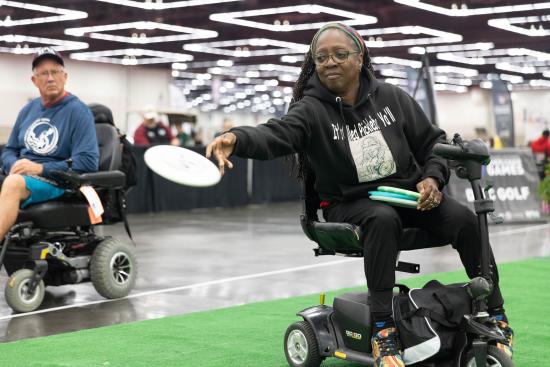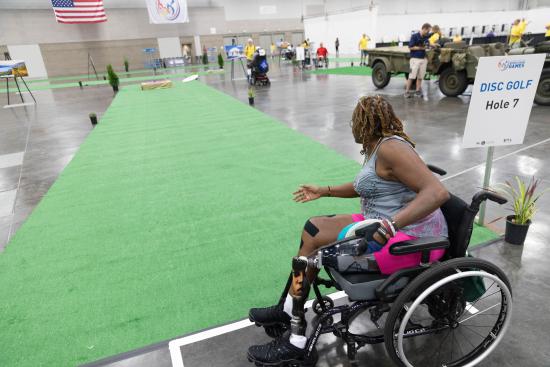Adaptive Rules for Disc Golf
Adaptive Rules for Disc Golf
Appendix F to the Official Rules of Disc Golf

On June 15, 2023, the PDGA Global Board of Directors approved the addition of a new Appendix F to the Official Rules of Disc Golf (ORDG), to be implemented as soon as was practicable. We are pleased to announce that this Appendix is now available for use at PDGA-sanctioned events.
This Appendix contains rule enhancements designed to be used in adaptive disc golf, such as at the National Veterans Wheelchair Games in July. These rule enhancements are in effect where a Tournament Director specifies that an event or certain division(s) will be playing under adaptive disc golf rules. The last time an Appendix was added to the ORDG was in 2018.
Read about disc golf in the 2023 National Veterans Wheelchair Games >>
This groundbreaking move forward can largely be credited to the passion and hard work of the Paralyzed Veterans of America (PVA) and 2019 United States Women’s Disc Golf Championship TD, Jeff Shattuck #23454, who are also organizing the disc golf competition at the National Veterans Wheelchair Games and have been giving adaptive disc golf clinics to veterans around the country.
“This year at the 2023 National Veterans Wheelchair Games in Portland, Oregon, we will be introducing the new rules and regulations,” said Jennifer Purser of the PVA, adding that they expect 120 participants in the adaptive disc golf section of the Games and intend to sanction the disc golf portion in 2024.

The impact of this addition extends far beyond this year’s Games, and began years ago, when Shattuck began working with PVA to bring disc golf to the disabled veteran community.
“My favorite event was our very first disc golf event at Loriella Park in Fredericksburg, Virginia in 2014,” Purser recalled. “Jeff Shattuck and I put the first program together, and we had several veterans come out and learn disc golf. They were excited from the beginning.”
Purser and Shattuck eventually brought disc golf training to the Richmond VA Medical Center in Richmond, Virginia. Purser explains that “we are showing them that their disabilities won't hold them back in life.” When asked about what makes working with veterans and developing adaptive sport so rewarding, Purser cited “the long-term friendships that come out of adaptive sports and the encouragement and support [the participants] all give each other.”
“No one is left behind,” added Purser.
Purser and Shattuck approached PDGA staff with a list of proposed rule enhancements and a description of why each enhancement was necessary.
“We felt it was important to go to the leaders in disc golf to become partners in supporting legitimate rules and regulations,” Purser stated. “We wanted to create consistency throughout the adaptive disc golf program.”

At that point, Policy & Compliance took those concepts and drafted the new Appendix, which was then vetted by PDGA staff and the Rules Committee, as well as undergoing legal review.
“We knew we wanted to do this right the first time,” said Mike Sullivan, PDGA Senior Policy & Compliance Officer, “and between the expertise brought by Jeff and PVA and the insight of the Rules Committee and PDGA staff, we are confident we hit the nail on the head.”
The PVA and Shattuck approved the final draft prior to the Board’s consideration of the topic at the recent Spring Summit, where the Appendix was approved.
“Appendix F adds much-needed clarity to the game of adaptive disc golf,” said Shattuck. “It defines important points and considers not only the positioning of mobility devices during play but also adverse conditions, which affect mobility devices. It also makes the sport accessible to quadriplegic and visually impaired players, who have limited hand and wrist movement or require beepers and other sound-emitting devices. In short, it includes people with disabilities and ensures their assistive aids are permissible in all sporting events and divisions.”

Where possible, the Appendix does not create new rules, but endeavors to instead codify assumptions that the Tournament Director has used their discretionary powers as already written in the ORDG. Here is a summary of the enhancements now available for use in adaptive disc golf.
- Defines “supporting point” as both the wheels of the player’s propelled mobility device and the space between those wheels, allowing the player to center their body on the lie.
- Greatly extends the depth of the lie from 30cm to 2m to allow the player to legally position their propelled mobility device behind the lie.
- Declares adverse conditions for propelled mobility device use, such as deep mud, unnavigable terrain, or steep slopes as obstacles physically preventing the player from taking a legal stance under 803.02.B.
- Declares that the Director of the event has authorized up to three meters of relief from out-of-bounds areas.
- Makes the sport accessible to quadriplegic players who have limited hand and wrist movement by giving TDs an option to create a hoop-based target that allows roller throws to hole out.
- Allow visually-impaired players to use beepers or other sound-emitting devices as if the Director had declared snow or night play.
- Specifies that the use of a propelled mobility device is permissible at events or in divisions using the provisions of Appendix F.
The PDGA looks forward to continued partnership with the Paralyzed Veterans of America, the National Veterans Wheelchair Games, and any other organizations that can help us make disc golf more accessible to everyone, regardless of disability status. While the development of these rule enhancements was in concert with a specifically American organization, this Appendix is available worldwide to any TD who wishes to help adaptive disc golf grow in their community.

“The PDGA is the leading partner for disc golf and well respected throughout the world. We knew partnering with them was best for the adaptive disc golf community,” concluded Purser. “We also hope in the next few years, it will grow to be a competitive sport that the PDGA will support and create true competition with rankings.”
If you have any questions about the applicability of this Appendix or how to apply these rules to your event, please contact PDGA Event Support (eventsupport@pdga.com).

Comments
Nice indoor layout! I want to
Nice indoor layout! I want to play there.